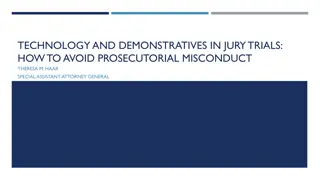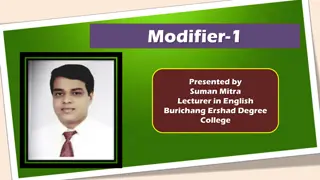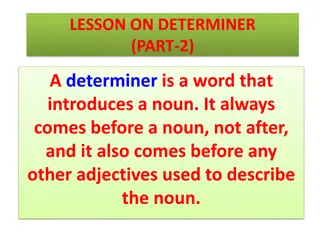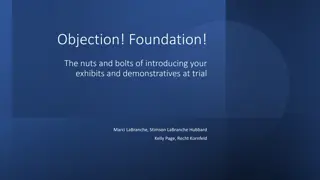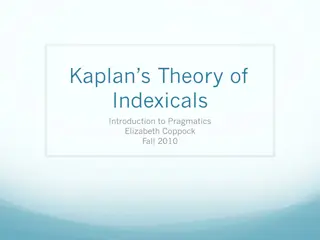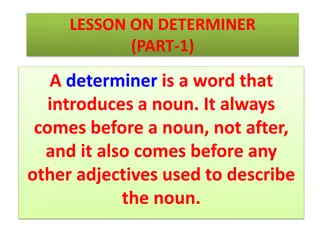Technology and Demonstratives in Jury Trials: Avoiding Prosecutorial Misconduct
Understanding prosecutorial misconduct in jury trials is crucial to maintaining fairness in the legal system. This article highlights the responsibilities of a prosecutor, the impact of misconduct, and ways to prevent it using technology and demonstratives. By following ethical guidelines and ensuri
0 views • 88 slides
Mastering the Art of Modifiers in English Language
Explore the rules and examples of pre-modifiers and post-modifiers in English grammar, including modifying nouns with adjectives, determiners, demonstratives, possessives, quantifiers, articles, verb forms, appositives, present participles, and infinitive phrases. Enhance your understanding of how t
0 views • 8 slides
Understanding English Determiners: Part 2
In this lesson, you will delve deeper into determiners in English, focusing on the types such as articles, demonstratives, quantifiers, and possessives. Specific examples and usage scenarios of determiners like "some," "any," "little and much," "few and many," "more, less, and fewer," and "either an
0 views • 10 slides
English Grammar Lesson on Demonstratives: This, That, These, Those
Explore the usage of demonstratives "this, that, these, those" in English grammar through engaging visual examples and practice exercises. Understand how to distinguish between proximity and distance when referring to objects and improve your language skills effectively.
0 views • 22 slides
Mastering Exhibit Foundations for Trial Success
Unlock the nuts and bolts of introducing exhibits and demonstratives at trial with essential rules of evidence, the importance of laying a foundation, and strategies for preparing and introducing exhibits effectively. Learn about authentication methods, self-authenticating records, and key considera
0 views • 21 slides
Understanding Parts of Speech: Determiners and Beyond
Exploring determiners as part of speech, including articles, demonstratives, and possessives. Learn how determiners classify nouns based on different criteria and discover the variations in determiners across languages.
0 views • 29 slides
Understanding Kaplan's Theory of Indexicals
Kaplan's Theory of Indexicals explores the concept of indexicality in language, defining indexicals as words whose referents depend on the context of use. The theory distinguishes pure indexicals from demonstratives and emphasizes the directly referential nature of indexicals. By delving into altern
0 views • 30 slides
Understanding Demonstratives: This, That, These, Those
Explore the usage of demonstratives such as "this," "that," "these," and "those" in sentences, along with exercises to practice identifying and using them correctly. Learn how these words help in pointing out specific items or individuals in English. Enhance your grasp of these essential language el
0 views • 9 slides
Understanding Definiteness in Central Kurdish Noun Phrases
The exploration of two DP layers within the Central Kurdish noun phrase reveals the application of functional elements to express definiteness. Examining the role of D-category and the morpheme -e sheds light on the markers of definiteness in CK, providing insights into prenominal demonstratives and
0 views • 20 slides
Understanding Determiners: Articles and Demonstratives in Different Languages
Explore the concept of determiners, focusing on articles and demonstratives in various languages. Learn about the differences between definite and indefinite articles and how they impact specificity and familiarity. Discover how languages without articles distinguish through word order. Engage in ac
0 views • 32 slides
Understanding Determiners in English Grammar
Determiners are essential components in English grammar that introduce and describe nouns. They come before nouns and other adjectives. There are four main types of determiners: Articles, Demonstratives, Quantifiers, and Possessives. Articles include indefinite (a, an) and definite (the) articles. D
0 views • 7 slides
